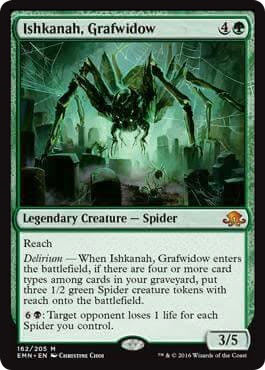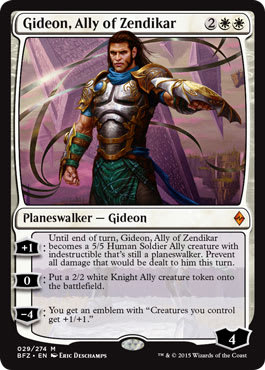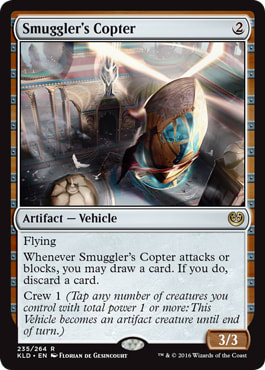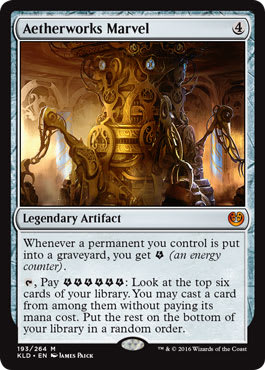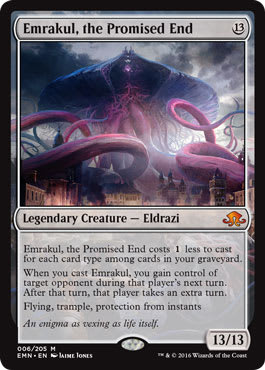What constitutes a healthy Format?
The health of a format is common topic of discussion among Magic players, but this conversation is too often absent context. What one player believes constitutes a healthy format may not be a shared opinion by another. So before I begin to analyze how healthy Standard is, I’d like to outline what I believe to be the essential components of a healthy Constructed format.
Balanced
This is fairly Self-Explanatory. If a strategy or a specific card is significantly more powerful than the rest of the format, then the format is unhealthy.
Diverse
There has to be numerous viable strategies in a format, and several of them have to operate on different axes. This is only the case to an extent though. If there are too many viable strategies that operate on a unique axis, an overbearing element of randomness is added to the format.
Interactive
How interactive the format is can vary greatly while still remaining healthy, but the ability to do so in a meaningful way has to be present.
Unique Gameplay
Similar to how interactive a format needs be, there’s a lot of leeway here. But If the majority of games follow similar play patterns, the format can become stale and boring rather quickly.
I’m sure there are other metrics you can use in addition to these, but this is a good baseline. If a format is failing in one of these areas, it can be seriously detrimental to enjoyment players get from it. When that becomes the case, it becomes necessary to look toward solutions. These solutions generally come in the form of bannings.
There’s a lot of ramifications that come along with bannings, so it’s not something that should be done liberally. But if the format is truly unhealthy, it’s important to identify the cards that are problematic and remove them.
Standard’s transition to powerful permanent based gameplay certainly lends itself to containing cards that can feel oppressive, but it’s a pretty rare occurrence for any of the cards to actually be too good. Every year it feels like there’s a crowd of people calling for cards like Pack Rat and Siege Rhino to be banned, but for the most part these ideas are dismissed as nonsense. With that being said, this is the first format I’ve played where the call for a banning has merit. When comparing the power level of Standard’s best cards to the rest of the format, the biggest potential offenders are Emrakul, the Promised End, Aetherworks Marvel, Smuggler's Copter, GIdeon, Ally of Zendikar, and Ishkanah, Grafwidow.
So should any of these cards be banned?
Well, how do they affect the pillars of the format?
Ishkanah, Grafwidow
Balance: Ishkanah can definitely feel oppressive at times especially if you’re trying to attack with small creatures. Its ability to gum up the ground for the cost of 5 mana and a single card is undeniably powerful. Ishkanah’s most valuable asset is perhaps how well it serves as a bridge to Emrakul. The large majority of the time an Ishkanah comes down against a creature based deck it will buy enough to time for an Emrakul come down and ultimately end the game. Ishkanah is a great card, but not really anything more than that. It’s a good value creature that is powerful versus a portion of the format and mediocre against the rest.
Diversity: There are plenty of playable strategies that don’t feature Ishkanah; and, despite how good it is against creature centric strategies, they’re still quite viable.
Interactivity: Producing four bodies, Ishkanah is difficult to interact with by traditional means. The only ways to interact with the card in an efficient manner are through cards like counterspells, Thalia, Heretic Cathar, and Declaration in Stone. But these cards do exist, and most of the time answering the 3/5 pushing through the tokens is good enough.
Unique Gameplay: Ishkanah definitely does contribute to stale gameplay, but Ishkanah isn’t really the direct cause. The ability to find Ishkanah with cards like Traverse the Ulvenwald and Aetherworks Marvel, turtle up behind your spiders, and end the game with Emrakul is likely too common of an occurrence though.
Verdict: Under no circumstances should Ishkanah be banned.
Gideon, Ally of Zendikar
Balance: Gideon is absurd. The amount of free wins you get just by putting the card in your deck isn't something that should be understated. For the longest time, I thought it was insane to register a deck without this card. These are certainly attributes that are potentially indicative of a card being too powerful, but power level is contextual. Gideon has likely never been too good, but as of right now it’s definitely not too good. Flying pressure being common in the form of Smuggler's Copter and the combination of Ishkanah plus Emrakul has knocked Gideon down a peg.
Diversity: Gideon is one of the biggest impediments for control being viable, but there are countless other reasons for that as well. A format also isn’t really unhealthy if something like control or aggro isn’t entirely viable, so long as there is enough variation in how decks play out.
Interactivity: Like most Planeswalkers, Gideon’s strength comes from how difficult it is to interact with. This is entirely by design though. Standard has been a Planeswalker centric for years, and while I’m personally not a fan of it there’s really nothing inherently wrong with it either.
Unique Gameplay: The games where the player who casts Gideon is ahead will generally always follow the same play pattern, +1 and beatdown until the game is over, but Gideon can create a lot of interesting situations. When the board is stalled, all of Gideon’s abilities have value so determining how to use it is often interesting.
Verdict: It sucks when you lose to a Gideon single handedly, but that’s not really a reason to ban a card.
Smuggler’s Copter
Balance: Smuggler's Copter was obviously Wizard’s attempt to push Vehicles in Standard. Starting off the format by putting 32 copies into the first event, it’s been and will likely remain a premier level card in Standard. Smuggler's Copter shores up some of the largest problems that aggressive decks in Standard face; it’s a resilient and evasive threat that offers protection against flooding. The card is insane, and every draw from a Copter deck is exponentially better when they have it on turn two than when they don’t. It’s a bit too early to tell exactly how powerful Copter is with it only really being explored in the context of current Standard, but it doesn’t seem like it’s on track to becoming oppressive.
Diversity: The biggest impact Smuggler's Copter has on diversity is the fact that it’s a mistake to not play it in any slightly aggressively slanted decks. It doesn’t really limit what can be played, but by being colorless and such a powerful tool for aggro decks there’s very little reason to not play it any deck that can use it. Wild Nacatl was banned in Modern because at the time it was believed there was no reason to play an aggro deck that wasn’t Zoo. This isn’t really the same problem though. There is variation among Copter decks. So until there is a definitive best Copter deck that essentially invalidates the rest of them, Smuggler's Copter isn’t exactly infringing on the diversity of the format.
Interactivity: Copter is resilient compared to most cheap creatures, but it’s pretty easy to interact with. Instant speed removal and cheap artifact hate can keep it in check pretty easily.
Unique Gameplay: Copter’s looting ability improves the consistency of aggro decks, so in some ways games are likely to be slightly more repetitive if decks are just curving out more often. That seems less relevant than the interesting decisions Copter often offers. Looting will often propose unique situations as will choosing when to activate if an opponent is representing removal.
Verdict: Smuggler's Copter is a very strong card, but I’ve actually liked what it offers to the format at least in terms of gameplay. The fact that every aggro list starts with Smuggler's Copter isn’t very interesting, but aside from that I think it’s perfectly fine for the format.
Aetherworks Marvel
Balance: On raw power level alone, Aetherworks Marvel is ridiculous. The ability to consistently pump out game winning threats on turn four in addition to providing inevitability in any sort of late game is unreal. I’m no game designer, but from a design perspective printing this card makes absolutely no sense to me. Not because it’s blatantly too good, just due to the fact that there’s no happy medium with the card. It’s either busted or unplayable. This in addition to the fact that it was obviously a bit pushed just really confuses me. If it’s either unplayable or busted, but it’s pushed, then they intended for it to be busted? I just don’t really get it.
Diversity: The existence of the Aetherworks Marvel archetype has basically made midrange decks unplayable. It’s impossible to go over the top of Aetherworks Marvel. They play the largest threats and Marvel provides more inevitability than any other card in the format. Outside of just playing Marvel, you have to try and go underneath them to have a shot in the matchup.
Interactivity: Marvel threatens to end the game as soon as it comes down, so permanent based removal is ineffective. This leaves only generic answers like hand disruption and counterspells as effective forms of interaction. And absent a clock, both of these are rarely enough on their own.
Unique Gameplay: Marvel can present some pretty unique scenarios, but only really when bricking on Marvel hits. Otherwise pretty much every game ends before they get a Marvel online or with a giant Eldrazi.
Verdict: I’m not entirely sure that Marvel needs to be banned. It’s possible that if they were to just get rid of another card in the Marvel decks they might suffer from the consistency issues the original iterations had. If they’re going to ban anything though, Marvel should certainly go with it for a few reasons. The first being what I mentioned earlier. If something else in Marvel is banned, what’s the goal? Either Marvel becomes unplayable or it’s still busted, there’s just no middle ground for the card. The other reason also pertains to what I mentioned earlier about the consequences of banning a card. Banning two cards at the same time isn’t much different than banning one, but banning one and then potentially needing to ban the other one a later date is a much different story.
Emrakul, the Promised End
Balance: At this point it’s apparent Emrakul was heavily pushed to ensure it would be one of the best cards in Standard indefinitely. There were three sets of buildup toward Emrakul, and Wizards wanted to deliver. And that’s exactly what they did; Emrakul is disgustingly good. It’s not a rare occurrence for the card to cost 6-8 mana, but it is a rare occurrence to put one into play and lose. A card this consistently powerful that can be played early either from Aetherworks Marvel or its natural cost reduction just hasn’t existed in Standard before, and likely for a good reason.
Diversity: For obvious reasons this causes pretty much the same problems as Marvel. Aside from Ulamog, the Ceaseless Hunger, there’s no going over the top of Emrakul. The result of this is basically every deck that wants to play a longer game needs to play Emrakul or else it’s probably unplayable.
Interactivity: An ability that triggers when cast combined with protection from instants makes Emrakul nearly impossible to interact with. The only card that’s solid against Emrakul is Summary Dismissal, but the only decks that can play it are bad against Marvel and atrocious against everything else. I don’t have much hope for Disallow either.
Unique Gameplay: It’s a different story every time.
Verdict: Emrakul, the Promised End is the first card I’ve ever fully endorsed to be banned in Standard. I think the card infringes on the health of the format in every way possible. Mindslaver effects should be enjoyed in moderation. When it’s the most common way games are ending in Standard, it’s miserable. When they’re stapled to 13/13’s with protection from instants that enter play between turn four and seven, they shouldn’t exist.
Bonus Decklist
I’ve written a lot more articles regarding theoretical concepts than I have about specific decks, but that’s because I personally find them more interesting. With that being said, I know most players love a good deck list, and I’m always playing and working on decks. So for now on, whenever I write articles without lists, I’ll throw a list I’ve been messing around with at the end of the article. Enjoy!
Jund Death?s Shadow ? Modern | Andrew Jessup
- Creatures (17)
- 1 Ghor-Clan Rampager
- 4 Death's Shadow
- 4 Grim Flayer
- 4 Street Wraith
- 4 Tarmogoyf
- Instants (9)
- 1 Dismember
- 2 Abrupt Decay
- 2 Temur Battle Rage
- 4 Tarfire
- Sorceries (14)
- 2 Inquisition of Kozilek
- 4 Gitaxian Probe
- 4 Thoughtseize
- 4 Traverse the Ulvenwald
- Artifacts (4)
- 4 Mishra's Bauble
- Lands (16)
- 1 Forest
- 1 Swamp
- 1 Overgrown Tomb
- 1 Stomping Ground
- 2 Blood Crypt
- 2 Bloodstained Mire
- 4 Verdant Catacombs
- 4 Wooded Foothills
- Sideboard (15)
- 1 Shriekmaw
- 1 Yixlid Jailer
- 1 Dryad Arbor
- 2 Ancient Grudge
- 1 Bojuka Bog
- 1 Liliana, the Last Hope
- 2 Liliana of the Veil
- 2 Anger of the Gods
- 2 Collective Brutality
- 1 Maelstrom Pulse
- 1 Inquisition of Kozilek
















